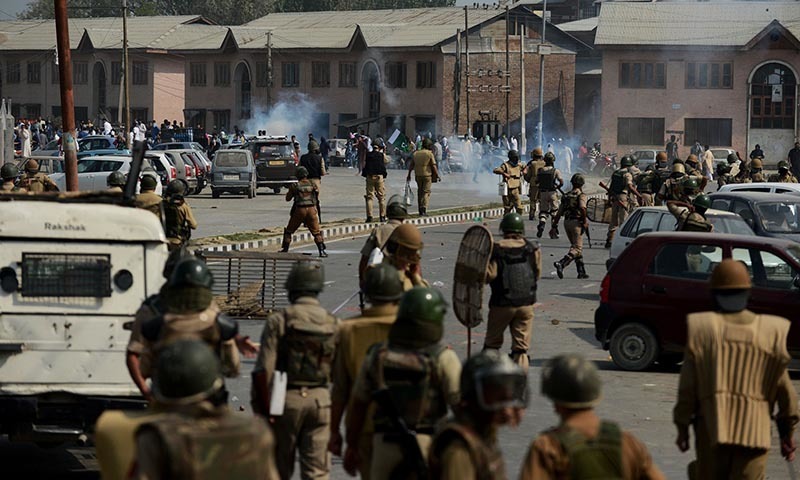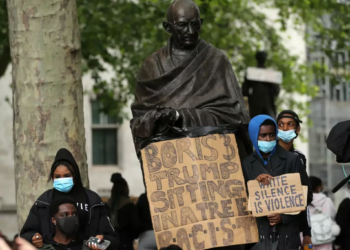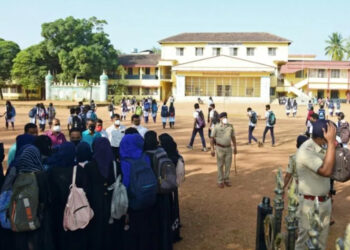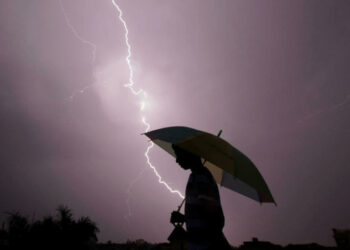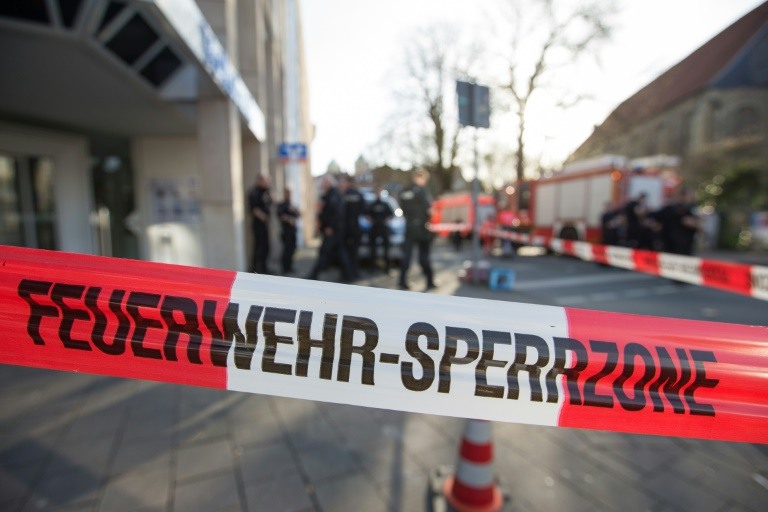On February 25, police constable Farooq Ahmed Yatoo was guarding the residence of separatist leader Fazal-Haq Qureshi on the outskirts of Srinagar District in Indian-administered Kashmir, when a group of militants opened fire and injured him grievously escaping with his rifle. The man later died in a local hospital.
A day after his killing, Amaq news agency, a news outlet linked to Islamic State (ISIS), claimed the terror group was responsible for the attack and published an image of the snatched rifle.
“Assassinated an element of police in firing near the city of Srinagar in Kashmir yesterday,” the agency stated, warning that “the war has just begun.”
On February 27, Police Chief SP Vaid for the very first time acknowledged ISIS presence in Kashmir, noting, however, that it was not “substantial.”
It was not the first time when the ISIS mouthpiece had claimed responsibility for an attack in the area. On November 17, when a police officer was killed in Zakura locality of Srinagar, Amaq also claimed ISIS was behind the incident.
The Indian Ministry of Home Affairs has long been denying the presence of ISIS in the valley.
“There is no physical infrastructure or manpower of the Islamic State in the Valley. It does not exist in the Valley,” the ministry’s spokesperson has said.
But a report, dubbed Central Armed Police Forces and Internal Security Challenges- Evaluation and Response Mechanism, filed by the MHA with the Parliamentary Committee on Estimates on March 19, said that the lone wolf attacks witnessed abroad could not be ruled out in India.
“Radicalisation of youth by terror outfits through the misuse of the Internet and social media has emerged as a big challenge in recent times,” the MHA said in the report. “The problem is further accentuated by the fact that the terror groups have started using secure social media platforms and proxy servers etc, to avoid detection by intelligence and law enforcement agencies.”
Youth Alienation
On March 12, three militants were killed by the Indian security forces in an encounter in Hakura village of Anantnag district in South Kashmir. The deceased included two locals, Eesa Fazli and Syed Owais, both of whom had left school to join the militants’ ranks, and Mohammad Taufeeq from Telangana state who had run away from home in 2017.
Tehreek-ul-Mujhadeen (TeM), a militant group operating from Pakistan-administered Kashmir was quick to say that the three individuals were its members, and claimed that Fazli was a district commander for Srinagar who believed in the “freedom struggle.” The police had earlier stated, however, that Fazil was behind a February 25 strike claimed by Islamic State.
At the same time, Telangana authorities alleged in a statement that Taufeeq was radicalized by ISIS through social media, noting that he left for Kashmir last year to join the militant ranks. At present, the claims and counterclaims are being investigated.
In the past several years, ISIS flags were flown during demonstrations against the Indian rule in a few parts of Indian-administered Kashmir.

According to Rao Farman Ali, a political commentator and author of the book History of Armed Struggles in Kashmir, the unfurling of ISIS flags is the result of growing alienation among Kashmiri youth and has nothing to do with ISIS activities in Iraq, Syria or other countries.
“ISIS in Kashmir is an expression of triple alienation. The Kashmiri youth is alienated by three sides: India, Pakistan and within Kashmir,” Ali told The Globe Post.
“This political mass has not been addressed and has been pushed to the wall, and they want to prove [themselves] in a different way. Otherwise, they don’t have any connections with ISIS in other countries,” he claimed.
On March 15, 2017, Minister of State for Home Affairs Hansraj Gangaram Ahir said in a written reply to question from the upper house of the Indian Parliament that the National Investigation Agency (NIA) and States Police were investigating 75 individuals linked to ISIS in 11 Indian states. Four of them were from Indian-administered Kashmir.
“‘Police’ and ‘Public Order’ being State subjects, the State Government concerned has been directed to take appropriate action against such elements as per relevant provisions of Law,” Ahir wrote.
Preserving Distance
Up to date, militant groups operating in Kashmir have largely been fighting either for the independence of the region or its merger with Pakistan. The appearance of the Islamic State ideology has seemingly worried both the government and the groups.
After several incidents in 2017, when a few suspected militants asked people to raise black flags similar to that of ISIS and Al-Qaeda, the Joint Resistance Leadership (JRL) comprising Syed Ali Shah Geelani, Mirwaiz Umar Farooq, and Mohammad Yasin Malik – the top three leaders in the valley seeking independence from India – issued a statement distancing itself from the global terror outfits.
The JRL called its struggle indigenous and said that terrorism and the freedom movement were poles apart.
In March, Mohammad Ashraf Sehrai, the chairman of the Tehreek-e-Hurriyat political party, expressed his deep concern with the section of youth falling prey to ISIS propaganda, and urged young people to better understand Islam. He also alleged that Indian agencies were trying to maligning the independence movement.
“Our agenda is simple. We only want Kashmir to be free from Indian occupation. Nothing else. Daesh and Al-Qaida have nothing to do with our movement and we will never accept them,” he said. “It could be the handiwork of agencies keen to defame the Kashmir movement and undermine its indigenous character.”
Double-Edged Sword
Sheikh Showkat Hussain, a professor of human rights and international law at the Central University in Kashmir, told The Globe Post that there may be some isolated individuals who want to create a hype rather than actually act when it comes to terrorism.
“Those [independence leaders] who matter over here have already distanced themselves and have condemned it,” Hussain said. He also urged the Indian government against using ISIS as a tool to malign the Kashmir’s indigenous movement as it could turn out to be a double-edged sword.
“It may help Indian establishment malign Kashmir resistance,” he said. “And on the other side if they create hype out of it, [it] may be an invitation to other powers as well to come and intervene in here like what happened in Syria. Then it would hurt Indian interests as well.”
CJ Werleman, a journalist, political commentator and terrorism analyst, questioned the claims made by ISIS regarding the two attacks in Kashmir, calling them “dubious at best.”
“Certainly ISIS would like to gain a foothold in the valley,” Werleman told The Globe Post. But the terror group, he says, is unlikely to succeed in attracting more than a few “mentally unstable” individuals at best.
“And for a number of reasons – the most important being Kashmir is a local indigenous issue and thus those who turn to militancy do so to oust the Indian military occupation, and therefore do not identify with global jihad movements or groups.”
He noted that there was much propaganda value for the Indian government in successfully whipping up an ISIS scare in Kashmir.
“The members of [Indian Prime Minister Narendra] Modi‘s government have a proven track record of utilizing and deploying fake news about Indian Muslims to mobilize political support, so while I haven’t seen any hard evidence of Indian agencies doing this in regards to ISIS in Kashmir, I don’t think it’s beyond certain political operatives associated with either BJP or RSS,” he said.
Keeping ISIS in Check
On March 14, addressing the Fourth Counter Terrorism Conference on “Changing Contours of Global Terror” in Gurugram, Haryana, Union Home Minister Rajnath Singh said the government has been closely monitoring the the situation with ISIS and how the group is using social media as “a key tool for ideological indoctrination, recruitment, and networking by targeting young generation and intellectual Muslims.”
He also noted that he was pleased that Indian social fabric had not been affected by the emergence of Islamic State.
“I am sure this will not have any further impact in our country,” Singh said.


